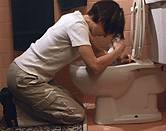
MONDAY, Dec. 10 (HealthDay News) — Tweens, teens and young adults who routinely overeat appear to be more likely to experiment with marijuana or other drugs, new research suggests.
The observation stems from a decade-long research effort, during which nearly 17,000 boys and girls were tracked to assess eating and drug-use patterns.
The bottom-line: Drug use increased among all overeaters, regardless of whether that behavior took the form of relatively controlled overeating or binge-eating behavior, which involves a loss of eating control.
“Previous research has demonstrated a link between overeating and binge eating and other health concerns, so most of the results were as we expected,” said Kendrin Sonneville, a registered dietician in the division of adolescent/young adult medicine at Children’s Hospital Boston.
She did suggest, however, that some findings, including that “teens who binge eat were no more likely to start binge drinking frequently than those who did not binge eat,” were somewhat surprising.
What’s more, Sonneville noted, although “it may seem that overeating and binge eating would only be a concern for individuals who are obese, this study shows that these behaviors are problematic for all kids. No matter what they weighed, teens who reported binge eating where more likely to start using drugs and to become depressed than those who did not binge eat.”
The study, which appears online Dec. 10 in the journal Archives of Pediatrics & Adolescent Medicine, received funding from the U.S. National Institutes of Health.
All participants were between the ages of 9 and 16 when first enrolled in the study. Between 1996 and 2005, they completed questionnaires regarding their eating and drug-use habits every one or two years.
At one point or another, the questionnaires asked about the use of marijuana, hashish, cocaine, crack, heroin, ecstasy, PCP, GHB, LSD, psychedelic mushrooms, ketamine, crystal meth and amphetamines, as well as nonprescription use of tranquilizers, painkillers, sleeping pills and stimulants.
The authors found that binge eating was more common among girls, reaching just over 3 percent among girls and 1 percent among boys. In turn, binge eating was linked to a higher risk for becoming overweight or obese, as well as for developing depressive symptoms. However, simply overeating — with self-control — was not linked to either.
Both overeating and binge-eating behaviors were associated with a greater risk for drug-use initiation, but not binge-drinking behavior.
“Based on the findings of this study alone, we can’t explain why adolescents who overeat or binge aren’t at higher risk for binge drinking,” Sonneville said. “It is important to note that frequent binge drinking was common in our study, [as] 60 percent of the teens started binge drinking during the course of the study.”
“The fact that we didn’t see an association between binge eating and the onset of frequent binge drinking may have something to do with the fact that this behavior is so normative among teens,” she added.
Registered dietician Lona Sandon, assistant professor of clinical nutrition at the University of Texas Southwestern Medical Center at Dallas, said the findings are in line with what she would expect.
“Most people might not make that connection between binge eating and drug use, but people often use food to address emotional states the same way they might use drugs,” she said. “They may be engaging in binge eating for a way to somehow improve their mood or … cover up negative emotions. That may be the same reason they also then turn to marijuana or some other drug.”
“We see this in cases when patients come in for bariatric surgery,” Sandon added. “In many of those cases the drug of choice, so to speak, was food. If you don’t change their mindset regarding food and out-of-control eating, they are going to keep having the same issues after surgery.”
“Often what happens is they turn to alcohol in place of food, because after bariatric surgery it’s much easier to down alcohol than it is food,” she added.
Although the study showed an association between binge eating and increased risk of drug use, it did not prove a cause-and-effect relationship.
More information
Visit the Nemours Foundation for more on binge eating and children.

